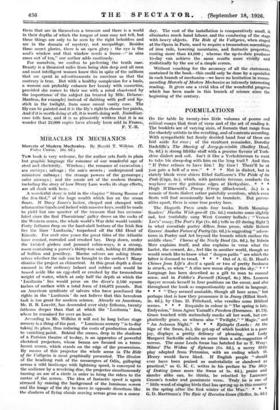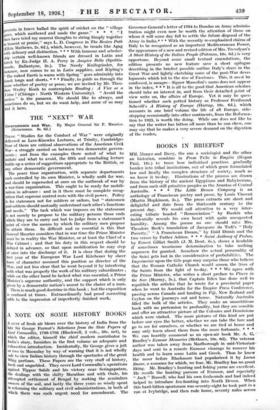POEMULATIONS
Oar the table he twenty-two little volumes of poems and Critical essays that treat .of verse and of the art of reading it. The booklets are of varying Sizes, of formats that range from the chastely artistic to the revolting,-and-of contents according. With sympathetic but firmly decided hand four of these are laid aside for ever ; of the resultant remainder, Dorothy Radcliffe's_ The :Shoeing of -Jerry-go-ninthle (Bodley -Head, 7s. ad.) is strong, lifelike stuff with a.genuine. flavour of_York- shire dialect and soil. -Isn't it like a Yorkshireman to want to take hiS sheep-dog with him ontbe !Ong trail..? And then "‘If peter refilscs to 'have him ! By .Gow ! Theer'll be at yon gate a hell. .of ,a row:" * .* * Not in dialect; but in stately blank verse shines Ethel Gallirnore's The Pride of the Peak (Cape; 5s.); which, With patriotic fervour, conducts the wayfarer over the gritstone edges: of lierbyshire.. _*. * Hugh _Penny. _Whecp (Blackwood,: 5s.) is a mosaic of Scots dialect rather painfully overdone, which even Scots will find occasionally hard to translate. But perver- sities apart, there is some true poetry here. _ . .
The. Hi:1011th Press sends- four books. Ruth Manning- Sanders' _ sad, Martha Insh-you.-ill (2s. Gd.) contains some slightly sad, but truthfully- sung • West Country ballads ;-- "'Vernon Lee's"essay, The Poced Eye (is. Gd-.) tells-us (0, dining flight !) in what essentials poetry .-differs_ from, prose, while Robert Graires' Another Future of Poetry (2s.. Gd.) is Suggesting" adven- tures in Poetry and Art beyond the bounds which enclose the middle class." Chorus of the Newly'Dead (2s. 6d.), by Edwin Muir explains itself, and also explains in verse what the harlot, the coward, &c., feel like in another world, though we would much like to know what " dargon paths " are which the latter is"deomed to tread. * * * Out of A. G. D. Road's Chimes from Life's Anvil a spark or two of pretty freshness is struck,- as when "A slim new moon slips up the sky." * a a Language has been described as a gift to man to conceal sense, and in Fiddler's Farewell (Knopf, 6s.) Mrs. Leonora Speyer reveals herself in four positions on the cover, and also throughout the book as unquestionably an artist in language. * * * " They seemed amicable; though all bore arms," but perhaps that is how they pronounce it in Jewry (Elliot Stock, 2s. ad.), by Chas. H. Pritchard, who versifies some Biblical scenes. * * .* Exquisite in colour is "The spring is late, Endymion," from Agnes Yarnall's Pandora (Dorrance. $1.75). Grace touched with melancholy marks all her work, but em- phatically grace, as witness also " Twilight," " Magic," and " An Autumn Night." * * * Epitaphs (Leeds : At the Sign of the Swan, 5s.), the get-up of which booklet is a pure joy, displays, a pretty delicacy of phrasing, and Lady Margaret Sackville admits no more than a sub-suggestion of worms. The same Leeds Swan has hatched for us T. Wray-. Milnes' The Widow of Ephesus (is. 3d.), a merry little play adapted from 'Petronius, with an ending which O. Henry. would have. liked. If English people " should ever have been praised as materialistic or slandered 93 practical," as G. K. C. writes in his preface to The Ship of Destiny (once more the Swan at 2s. 6d.), praise and slander alike can, he thinks, be rebutted by Laurence Groom's tender and passionate verse. Truly he is one of " little weestofsinging birds that has sprang up in this country in the spring after- the first winter of the War." * * * G. D. Martineau's The Epic of Hornden Green (Helfer, 2s. Gd.) resents in brave ballad the spirit of cricket on the " village green, which mothered and made the game." * * hen have tried my nearest thoughts to string Simply together in lament or praise,'? says L. D. Cosgrove in The Beaten Path (Elkin Mathews, 2s. 6d.), which, however, he treads like Agag with delicacy and distinction. * * * With humour and scholar- ship certain well-known friends are dressed in Latin and Greek by Ex-Judge H. A. Perry in Auspice Bello (Spottis- woode, Ballantyne, 2s.). The Needy Knifegrinder, for instance, now comes to us in Latin sapphics, and Kipling's The naked Earth is warm with Spring " goes admirably into Greek longs and shorts. * * * Finally, to guide us through the maze whether of poetry or prose, we are invited by Mr. Theo- dore Wesley Koch to contemplate Reading : A Vice or a rirtue ? (Chicago : North Western University). " Avoid the useless " is the panacea. We should like to always, and sometimes do so, but we do want help, and some of us may find it here.































































 Previous page
Previous page